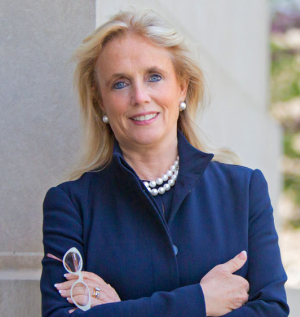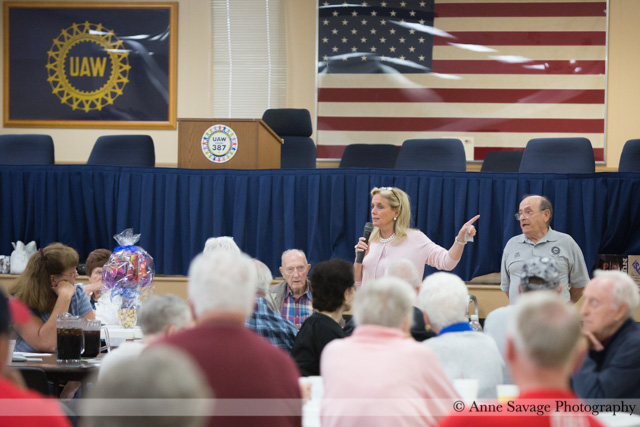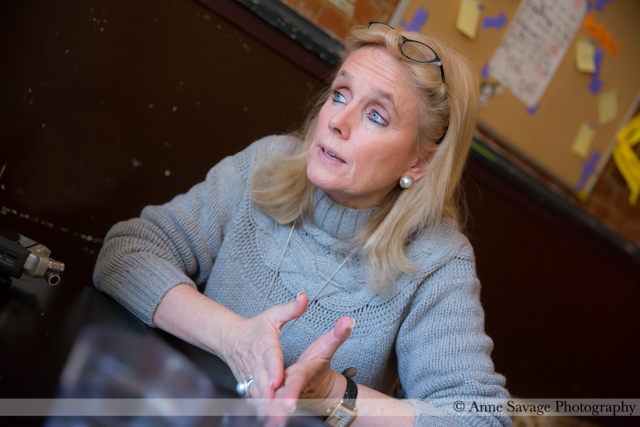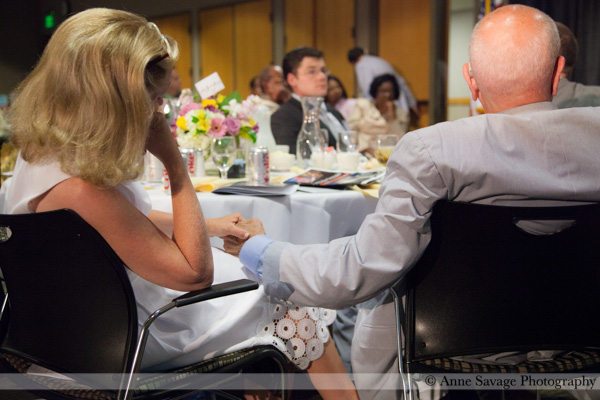 As a member of the 7th Congressional District, “represented” by Tim Walberg, I consider the 12th District my adopted district and Congresswoman Debbie Dingell as my actual Representative. That’s because, on just about any topic or issue you could name, Debbie Dingell DOES represent my views. She’s as solid a progressive as you could ever hope to meet.
As a member of the 7th Congressional District, “represented” by Tim Walberg, I consider the 12th District my adopted district and Congresswoman Debbie Dingell as my actual Representative. That’s because, on just about any topic or issue you could name, Debbie Dingell DOES represent my views. She’s as solid a progressive as you could ever hope to meet.
From the moment Debbie Dingell announced her candidacy for her husband’s seat, she made it very clear that her last name meant nothing and that she was going to prove to voters that she is a hard worker who would earn their vote. Watching her first 100 days in Congress, it’s clear that she is doing exactly that. Before she was even sworn in she was on CNN speaking out against Fast Track trade legislation and taking a leadership role in that battle to protect American workers and American manufacturers. She has also already been an outspoken advocate on a variety of issues impacting women including co-sponsoring the Paycheck Fairness Act and vigorously supporting paid sick leave legislation at both the state and federal levels.
I sat down with Congresswoman Dingell last week to talk about her first 100 days, the issues that she’s already working on, and what things are on the horizon for her in Congress.
[All photos by Anne Savage.]
I wanted to sit down and chat with you because you have now been a member of Congress for 100 days as of April 15th. You have a history of being involved with people who are in Congress as the wife of a sitting Congressman. How different is it now that YOU are the member Congress? How has your relationship to the rest of the people there changed? Is it different than you thought it would be?
There are things that you expected, things that you didn’t expect, and there are things you just keep doing. I have good friends who have stayed my good friends and who have been supportive and are there to answer questions and to guide and to give good advice. And they’re the most important people that there are.
 I’ve really kept my head down. It is really important to me that people know that I’m just a hard worker and that I understand that my last name means nothing, that I’ve got to earn my stripes. I’ve got to show people that I am a hard worker with abilities. So, that’s been a very important part to me.
I’ve really kept my head down. It is really important to me that people know that I’m just a hard worker and that I understand that my last name means nothing, that I’ve got to earn my stripes. I’ve got to show people that I am a hard worker with abilities. So, that’s been a very important part to me.
There are people who want to remind me that I’m a freshman and have treated me like, “You should go stand in the corner and be seen and not heard.” Nobody ever needed to tell me that but there are people who can’t wait to tell you that!
And there are others who say, “Why aren’t you more vocal?”
I wouldn’t say you haven’t been vocal. I mean you stepped right out your first week and came out against the Fast Track legislation…
You know, people sometimes think that politics is contrived. But the first two issues that I was out in front on were very important to me. I was on CNN as an incoming freshman before I had even been sworn in and I got asked about an issue that I knew and had studied my whole career. I knew exactly where I stood and how strongly I felt so I stated how I felt and people immediately began to zero in on me because I was not going to be supportive of Fast Track. But, when you come from Michigan and trade is so critical to the autoworker here in this state, you know what you stand for. You don’t have to be taught.
Fast Track was something that expired under President George W. Bush, correct? And now they are talking about renewing it and that basically allows the President and his administration to negotiate trade deals…
Right, to negotiate trade deals and bypass the Congress. Congress doesn’t get into the details.
They just get a yes or no vote on it.
Right. And the TPP – the Trans Pacific Partnership – does nothing to address currency manipulation. And any trade that is negotiated that doesn’t include or address currency manipulation is not something that I can support or that anybody from Michigan, I think, should support.
Has that been the case? That the Michigan delegation has not been supportive of it?
The Democrats have all come out opposed. I do not know where a number of the Republicans will come out.
The Fast Track legislation was actually introduced by Republicans, correct?
The legislation that was introduced last week was bipartisan and had the President’s support. Ron Wyden, a Democrat from Oregon, had been an important part of those discussions.
On the anti side?
They needed to get him on board for it to move so…
So he’s supportive of Fast Track?
It’s not clear. The hearings began, there will be markup, and people believe that he will support the bill that [Utah Senator Orrin] Hatch introduced last week. There are a few Democrats supporting it. It’s going to be interesting to see what happens in the Senate. Where I’m very focused is on the House where I do not believe that there are votes right now for it to pass and I’m working very hard to educate my colleagues about what this bill really means and what it means to everyday working men and women. Particularly, for me, in the auto industry, but in the agricultural arena, as well.
The Fast Track legislation is separate from the TPP itself, correct? If you pass that then the TPP can be passed under Fast Track.
They are very tied together. The President’s already made clear that he’s negotiating TPP and it’s not going to include currency manipulation.
Right now, in this country, with the yen at 120 to a dollar, there is an $8,000 cost advantage to a Japanese manufacturer selling a car in this country. That $8,000 advantage is used to undercut the cost of parts in that car, to undercut advertising costs, or, quite frankly, just to slash the cost of what vehicle is sold for in this country. Last year Toyota made more in this country on currency manipulation than Ford Motor Company did in its worldwide operations. That’s wrong. That’s not okay.
You and I know the worker in this state. We can build a car better than anybody in the world and compete. But you can’t compete on an unlevel playing field against the Bank of Japan or the Japanese government. And WE need a government that’s going to fight for us the way the Japanese government fights for its manufacturers.

Fast Track would apply to any future treaties, as well, right?
Well, it’s got an expiration date but, yes, until it expires it would.
So that’s an ongoing thing and you’re going to stay part of that conversation, I would assume.
I am one of the lead people on this. Rosa Delora from Connecticut is the lead person that has organized us in a very effective fashion to make sure that we’re educating people. After she saw me on CNN, she recruited me to the whip team so, before I was even sworn in, I was a member of the whip team working to defeat Fast Track and the TPP.
Some of the other things that you’ve been working on have related to gender-based discrimination like the wage gap and the ability for women (and men) to receive paid sick leave. How is that going? I know you were the sponsor of the Paycheck Fairness Act.
After the trade issue, we all immediately discovered one of the things that should keep everyone awake at night. And that’s that,when legislators are passing bills and trying to cut deals, that one of the deals that was cut would have allowed convicted domestic abusers to carry concealed weapons in this state. As someone who has been through this sort of thing, I have tried hard to put a face on the reality of domestic abuse. We sometimes want to say that these types of societal issues only involve certain income levels or certain socio-economic backgrounds, or certain genders and that’s not the case. When I found that out, I felt that I had no choice but to come out and work very hard to have the Governor veto that bill. So that was the second issue that I became very vocal about.
And you were effective, too, right? He did veto that bill?
He did veto that bill.
And now it’s back with that particular element removed.
Correct. Look, I support men and women and I would not be where I am today had it not been for men who have mentored me and helped me along the way. But I also know what it’s like to be discriminated against as a woman. In my first job interview, the man who interviewed me said, “Why would a woman want to work at General Motors?” I have been sexually harassed in the workplace. And I have seen other forms of gender discrimination.
I want to work for everybody and I want to represent everybody but I’m also sensitive to diversifying the policymakers so that there are more women in the public policy arena. And women should be paid equally for equal work.
The last time the Paycheck Fairness Act came up, every Republican in the Senate voted against it. And, in the House, John Boehner didn’t even let it come up for a vote.
And that may be what happens again. But it doesn’t mean that you don’t fight. It can take a very long time to get something that you care about deeply passed. Now everybody takes Social Security for granted but it took years to get Social Security approved by Congress. Medicare, when John was cleaning out his office, I think I found probably one of the first hand-written versions of Medicare that his father wrote in the 40s. And it didn’t pass until 1965. So, we have to continue to shine a light on the fact that there are women who are not being paid an equal wage for equal work.
As a woman, one of the things that I want to do is to try to be supportive of other women. Because I am where I am because of the women who went before me and helped to open the doors wider. One of the responsibilities that I have – and I’m going to be working on a lot of issues – is to continue open those doors wider to help the next generation of women.

You’ve been fighting for this stuff since forever, right? I remember watching you on the campus of the University of Michigan during a Planned Parenthood rally talking to young women saying, “We fought and won these battles, don’t let us backtrack.”
What people don’t realize is that I’m not that old. I have a little more seasoning in me than other people do. But it is within a generation that I went to school and there was no requirement that girls have equal access to sports that the boys had in the public school system. I mean people need to understand that, when I started my job at General Motors, mammograms were not offered and were not part of standard coverage.
I discovered when a friend became very ill in college and there were no answers, that women were not included, they were specifically precluded from being covered in any federally-funded research because they have hormones. And, by the way, we worked hard and finally got that addressed. After it did get addressed, within three years of the first study that was done, they found out that one of the preconceived notions about estrogen was totally wrong.
Even have said that, the FDA now is not including women in drug testing because they have hormones. Yes, we need to worry about pregnancies and fertility. But, if we’re going to test things, we need to include women. I mean we’re more than 50% of the population!
People do not understand that there is regular discrimination going on. I as woman feel it. Blacks feel it every day. I live for the day when no one asks me a gender-based question or a race-based question. I think it’s great that you, as a younger generation, have not had to deal with a lot of things that we’ve lived with. But the reality is that women today, as well as African Americans, are still facing discrimination in different ways.
And, by the way, I don’t think white males should be discriminated against either. And there are times when they feel discriminated against. We’ve got to figure out a way that we treat everybody equally.
I would say that, with this generation, because they weren’t there for the fights that happened in, say, the 60s or 70s or 80s, probably don’t appreciate how tenuous those gains can be in things like reproductive rights and how important it is to continue to fight. Because our opponents on these issues will continue fight to degrade those things.
I am a Catholic woman. I could never have an abortion. But, you know, our forefathers came to this country because they sought the rights of freedom of speech, freedom of religion, freedom of many things. And that is an individual’s right to choose. I do not have a right to impose what I think on somebody else.
In terms of that sort of thing, I think the paid sick leave issue is one that impacts both women and men and all races and demographics. How is that going? That’s the Healthy Families Act.
People are working on that at both the federal level and at the state level. I think, again, this is an issue where people need to raise awareness. When I went to Georgetown there were very few women and when I entered the workplace there were also very few women initially. At General Motors one of my colleagues and peers and a friend, Mary Barra, is now CEO of the company.
Women are now in the workforce by sheer economic necessity. But one of the challenges is that they still bear the brunt of a lot of the family duties. It’s great to see men pick up helping with household chores and childcare, etc., but the reality is, and the polling shows, that women are still doing two-thirds of it. So, they’re trying to balance all of this.
This legislation would actually give paid sick leave to both men and to women so that you don’t have to make a choice if you wake up with a 102 temperature about whether you can afford to go to work or not. When that’s happening, you’re endangering the workplace, you’re endangering the restaurant. Many of the people who are having to make those kinds of decisions are actually service workers, etc.
It’s trying to address this issue in the workplace to have more flexibility but, at the same time, we DO need to be aware that there are small businesses, people that are barely making it by. So, we need to talk about all of these issues like whether or not you incorporate a small business exemption. Simply not dealing with them doesn’t make them go away.
Another thing you’ve been working on is college affordability. There’s the Bank on Students Emergency Loan Refinance Act, for example.
To me that’s one of the most important things that I’m doing right now. The 12th District is very lucky to have both the University of Michigan and Eastern Michigan University and U of M Dearborn. But there’s also Washtenaw Community College, Henry Ford Community College, Wayne Community College. We have a lot of young people who we are educating. Before I went into this job, I was Chair of Wayne State’s Board and I’ve worked with young people for a very long time.

The average young person, an undergraduate, is graduating with more than $30,000 in debt. Until recently, many of those student loans were at 7%, 8%, 9%. They have very high interest rates. You can refinance a home. You can refinance a car. But you cannot refinance a student load. We need to do many things to make education more affordable and to not saddle our young people with massive debt. One of them is to allow them to refinance at the current lower rates. That’s one basic thing.
But we also need to figure out a way to lower tuition for our young people. I remember when Michigan had one of the higher ed systems that everyone in the country totally admired and respected. When we reduced the budget, we disinvested in higher ed. You’re starting to see that happen more. We need to put more money into Pell grant programs. I am someone who is concerned about the metrics at both the federal level and the state level, so it’s not just a state issue. Not every student is someone who can graduate in six years. Many of the people who need those Pell grants are the very ones who have less money and have to work full-time. So, they’re going to school and working and it takes them longer to graduate. We need to address that.
President Obama has put forward a proposal to look at making community colleges free. People have to be good students, you have to look at how you do it while eliminating waste and fraud in other places so that you’re not increasing the budget deficit. But, you know, Germany is offering four-year education to its young people for free. They are one of the most advanced industrial countries in the world. I want to know how they’re doing it and I want to learn from them so that we can figure out how to take care of our young people.
I say this all the time and I stole it from John Dingell: “Young people are 25% of our population and 100% of our future.”
Anything else that you’re working on that you want to talk about?
Well, the issue that will become one of my signature issues is long-term healthcare. I wasn’t looking to become an expert on the issue but, when John became seriously ill, I began dealing with a system that is really broken. I’m not known for being shy or retired and navigating a broken system that’s not integrated, dealing with insurance companies and doctors, and misdiagnoses, and access to services, and how you’re going to deal with a myriad of problems was a real eye-opener for me. He became sicker and, frankly, almost died because I could not get him the care that he needed, even knowing the care that he needed. And I know that I am luckier than most people.

The Affordable Care Act does nothing to deal with long term care. I have a paper that will be in the Harvard Policy Journal this summer that says we’ve got to deal with this issue. Medicaid and Medicare are the two programs that help fund long term care now but neither is set up to do it. Medicaid is for low-income people and its very difficult to navigate and it’s also geared toward patient care that’s in some kind of residence. It isn’t focused on trying to keep people in their own home which is a much less expensive way to help give someone support.
Medicare is very short-term if you’ve got an immediate illness. It’s got a lot of rules and regulations that make no sense. You’ve got to stay in the hospital at least three days to even be eligible for any in-home care. You’ve got more than 50 different programs. Every state has its own program. It’s a broken program and, by the way, it doesn’t take care of anybody longer than 90 days. And yet you’ve got an aging population that is going to double in the next 20 years. There are not even enough home-care workers available to help people. We’ve got to start talking about this or we’re going to have a crisis of such major proportions that this country isn’t going to know what’s hit it.
So, this is my number one issue.
Hillary Clinton announced her candidacy last week. Are you going to be endorsing her?
I’m in. I’ve known her for a long time now. I think she is going to be the nominee. I think we all need to work together to talk about the issues and to do a good job in defining what the choices are going to be in 2016 – because I think the choice will be stark – about the direction and the values of where we want this country to go.
Anything else?
There are three other things I’d like to say. One, even though you’re a liberal blog, I think it’s important to recognize that people are tired of partisan fighting. They want to see people try to work together to find solutions. So, when someone comes to me with a problem on housing or veterans issues, money comes in from the federal government to the state and I think we’ve got to look outside of the box. We’ve got to figure out how we’re going to solve these problems. We need to go get people that want solve problems and work together.
Second, there have been a number of veterans issues that people have brought to my attention and I really want to build a Fisher House in Ann Arbor for the families of the veterans who are staying at the VA hospital there. I’m working with the state on that. We’re lucky that Michigan doesn’t have the wait times that some of the other institutions do. We have two veterans hospitals. One of them has the name of John Dingell on it so my heart is always going to be there and the other is in Ann Arbor. I have a responsibility to those veterans to make sure that they are getting the care that they need.
But there are so many people who want to help. When we did the – I take no credit for anything that’s not mine – somebody else had the idea for Valentines for the Vets and we got 2,500 Valentines in two weeks that were made by people to give to veterans. You know, a lot of these veterans are lonely. They just need to know somebody cares about them. And everybody wants to help them but people don’t know how to give them help. So, I said let’s start this “Smiles for the Vets” program all year ’round.
But we also, as a community, when we’ve got people who have been in the reserves and overseas and their families need help, how many people do you know that want to help them? Somebody needs their grass cut or somebody is sick or a mother has got kids and just needs a respite night. This is a community that wants to give So, how do we organize and try to do that kind of stuff? I think we’ve all got to work together to try to solve those different kinds of problems.
Finally, I did an NAACP roundtable last week on race and whether or not Ypsilanti be another Ferguson, Missouri. Not talking about the very serious socio-economic issues doesn’t make them go away. There are some very raw, open, festering issues that we have got to bring the community together to talk about. That’s very important to me.
Are you feeling like you’re going to be able to or have been able to in your first 100 days to reach out to people on the other side of the aisle?
I’m working very hard on that. Like the night of the budget – and I don’t agree with them on the budget – but, to the surprise of everybody there were some major breakdowns on the Republican side. Nobody knew what was going on. Now, I’d like to clear something up: there aren’t really these “smoke-filled backrooms” that everybody thinks there are. But, having said that, seven or eight of them went to the back room and were smoking cigars and I went back there and sat as close to the window as I could. But I sat there and talked to them. They’re not the enemy.
On long-term care, I don’t know anybody who doesn’t have – I’ve got a spouse who I love who is, thankfully, doing better – but a parent or a relative or a friend. Everyone has a stake in this issue.
In the process of this whole long-term care saga, I was at the doctor with John to get him a new hearing aid because when he was in the hospital his hearing aid broke. Thankfully, I got it fixed within the first hour. But, for awhile, there was that desperateness, that fear of, “Oh my God, what am I going to do if he can’t hear?” So, one of the first things I did when I got him up and around was to go get the new hearing aid. When I was there, I found out that Medicare doesn’t cover hearing aids. And I asked the doctor, “How many people do you see that need a hearing aid who don’t get one because they can’t afford it?”
She said 50% every day.
I’ve gone now and researched it. I’ve said to my staff, “Tell me what else Medicare doesn’t cover.” It doesn’t cover foot care. It doesn’t cover glasses. You know, I was showing that to some of my Republican colleagues and they’re like, “Well, we gotta do this, too, and we gotta do this.” I told them, if we try to do it all, it’s never going to happen. But, everybody understands what kind of quality of life are you going to have if you can’t hear.
So that’s one of the first bills that I am going push very hard is to have Medicare cover hearing aids.
And you feel you’re going to have bipartisan support for that?
I sincerely hope so. I’m starting that fight right now.



